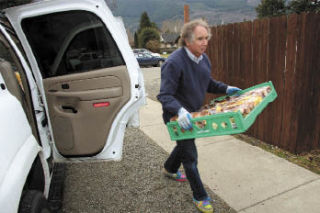With the economy in increasingly worse shape, more people are turning to North Bend’s food bank, Mount Si Helping Hand. Since last fall, the number of households it serves has jumped from 240 to 310 every week, according to Gail Gergasko, outgoing executive director.
“We’re seeing probably 15 new households a week,” said Gergasko, who is retiring after running the food bank for 10 years.
Helping Hand is expected to help around 1,300 households this year, up from around 1,100 last year.
Taking over is Chuck Talburt, a former public health microbiologist-turned-pastor from Woodinville. He helps run his church’s food bank, which serves 15 families a week.
The size of North Bend’s operation overwhelmed Talburt at first.
“I work with a little home refrigerator [in Woodinville], and here this place has a walk-in freezer that holds thousands of pounds of food,” he said.
A constant stream of volunteers went in and out of the freezer, storing newly delivered food and getting food out for Helping Hand clients. The line of people picking food up stretched out the door and up the driveway.
Talburt, who expects to take over fully in early March, is reluctant to talk about himself, but when asked about helping those in need, his voice perks up and he punctuates his points with sweeping hand gestures.
“I think the way they’re serving people here is what Jesus called me to do as a pastor,” he said.
Helping Hand is housed at the North Bend Community Church, but is an independent, non-religious organization. It is affiliated with Food Lifeline.
The food bank depends on volunteers to function, and around 100 people give time every year, said Gergasko.
Talburt remembers asking Gergasko, where do the volunteers came from?
“Gail said, ‘They just show up,’ and I thought, ‘yeah, sure’,” recalled Talburt, adding that he’s used to having to sometimes prod people to volunteer at church.
But his disbelief was soon broken when he showed up to help unload a delivery truck packed with 1,000 pounds of food.
“All of a sudden all these people just showed up and started working,” Talburt said.
The food was offloaded and stored in 35 minutes.
“I asked Gail, ‘what am I supposed to do?’” he said. “The executive director could go away and these people would still come down here and get it running.”
He sees his role as an organizer and representative to the community.
One responsibility of his will be getting money for Helping Hand, which has an operating budget this year of $104,000. Around 43 percent of its money comes from the cities of North Bend and Snoqualmie; 33 percent is from two federal grants from the Federal Emergency Management Act and the Emergency Food Assistance Program; and 24 percent is from local businesses, residents, churches and other groups. Nearly 85 percent of its money is spent directly on food and food delivery, according to Gergasko.
Helping Hand has seen a decline in contributions from individuals.
“Not only does it take away from what you had, but the needs are up,” she said.
North Bend and Snoqualmie increased contributions this year, but the food bank might see its federal grant money decrease.
Both Gergasko and Talburt expect the continuing recession to increase the number of people relying on the food bank for help, but neither is worried about being able to meet the growing need.
“I know the community will be there to help,” Gergasko said.
After stepping down, she will continue to volunteer with the food bank. She is also considering other projects as well, including a mobile food bank to help people who have difficulty getting out, and a backpack program to provide food on weekends and during the summer for children of low-income families.
“They get subsidized meals at school, but what do they get the rest of the time?” she said.
An avid gardener, Talburt wants Helping Hand to provide more fresh, organic produce. He’s exploring ways to draw on local gardeners to donate some of their extra crop.


